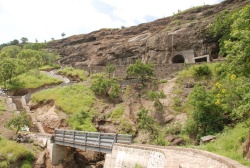Difference between revisions of "Aurangabad Caves"
| (One intermediate revision by the same user not shown) | |||
| Line 3: | Line 3: | ||
| − | The | + | The [[Aurangabad caves]] ([[Marathi]] :[[औरंगाबाद लेणी]]) are 12 artificial rock-cut [[Buddhist shrines]] located on a hill running roughly [[east]] to [[west]], nearly 2 km [[north]] from Bibi Ka Maqbara in {{Wiki|Aurangabad}}, {{Wiki|Maharashtra}}. |
| − | The first reference of | + | The first reference of [[Aurangabad Caves]] is cited in the big [[Chaitya]] of Kanheri. |
| − | The | + | The [[Aurangabad Caves]] were dug out of comparatively soft basalt rock during the 6th and 7th century. |
[[Caves]] are divided into three separate groups depending on their location. | [[Caves]] are divided into three separate groups depending on their location. | ||
| − | Sculptural carvings of | + | Sculptural carvings of [[Aurangabad Caves]] reached belong to [[highest]] achievements of [[Indian]] classical [[art]] and can be compared to the best paintings of [[Ajanta]]. |
| Line 17: | Line 17: | ||
| − | Carved in the Sihaychal ranges, overlooking the sprawling campus of Dr [[Babasaheb Ambedkar]] Marathwada {{Wiki|University}}, the | + | Carved in the [[Sihaychal]] ranges, overlooking the sprawling campus of Dr [[Babasaheb Ambedkar]] Marathwada {{Wiki|University}}, the [[Aurangabd caves]] somewhat have been overshadowed by the [[UNESCO]] [[World]] Heritage monuments of [[Ellora]] and [[Ajanta cave]] [[temples]]. |
Though its sculptures are comparable with the best in [[Ajanta]] and [[Ellora]], [[scholars]] continued to [[disregard]] this {{Wiki|cave}} group. | Though its sculptures are comparable with the best in [[Ajanta]] and [[Ellora]], [[scholars]] continued to [[disregard]] this {{Wiki|cave}} group. | ||
| Line 28: | Line 28: | ||
==[[Caves]] I and III== | ==[[Caves]] I and III== | ||
| − | [[Caves]] I and III of | + | [[Caves]] I and III of [[Aurangabad]] and last [[caves of Ajanta]] co-existed as is apparent from striking parallels which we come across while examining both the sites. |
| − | Again at | + | Again at [[Aurangabad]] after a careful study of both [[caves]] I and III, the conclusion the {{Wiki|Historians}} have come to is that {{Wiki|cave}} III was earlier to {{Wiki|cave}} I. |
In {{Wiki|Cave}} III the artist seems to have decorated with surprisingly neat and organized designs of fretwork, scrolls, panel of couples, tassels, [[flowers]], geometrical designs, and [[highest]] point of [[perfection]] and consummation." | In {{Wiki|Cave}} III the artist seems to have decorated with surprisingly neat and organized designs of fretwork, scrolls, panel of couples, tassels, [[flowers]], geometrical designs, and [[highest]] point of [[perfection]] and consummation." | ||
Latest revision as of 15:53, 9 February 2016
The Aurangabad caves (Marathi :औरंगाबाद लेणी) are 12 artificial rock-cut Buddhist shrines located on a hill running roughly east to west, nearly 2 km north from Bibi Ka Maqbara in Aurangabad, Maharashtra.
The first reference of Aurangabad Caves is cited in the big Chaitya of Kanheri.
The Aurangabad Caves were dug out of comparatively soft basalt rock during the 6th and 7th century.
Caves are divided into three separate groups depending on their location.
Sculptural carvings of Aurangabad Caves reached belong to highest achievements of Indian classical art and can be compared to the best paintings of Ajanta.
Introduction
Carved in the Sihaychal ranges, overlooking the sprawling campus of Dr Babasaheb Ambedkar Marathwada University, the Aurangabd caves somewhat have been overshadowed by the UNESCO World Heritage monuments of Ellora and Ajanta cave temples.
Though its sculptures are comparable with the best in Ajanta and Ellora, scholars continued to disregard this cave group.
Though in the 20th century, a few scholars started looking at these cave temples as a missing link between Ajanta and Ellora and also after an exhaustive study, were compelled to describe it as a “
Sensitive remaking of life situated in time and space span”. It is a protected monument under the Archaeological Survey of India.
Caves I and III
Caves I and III of Aurangabad and last caves of Ajanta co-existed as is apparent from striking parallels which we come across while examining both the sites.
Again at Aurangabad after a careful study of both caves I and III, the conclusion the Historians have come to is that cave III was earlier to cave I.
In Cave III the artist seems to have decorated with surprisingly neat and organized designs of fretwork, scrolls, panel of couples, tassels, flowers, geometrical designs, and highest point of perfection and consummation."
